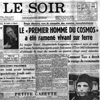National Content: Belgium
The first man of the Cosmos has been brought back to Earth.
| Source | "Le Soir", the 13th of April 1961, pages 1, 3, 5. |
| Event referred to | 12th of April 1961 : Yuri Gagarin : the first man in space |
| Technological characteristics | Type of file: Image Extension : pdf Characteristics Dimension of the file: < 2000 Ko Availability proposed: pdf document with zoom options |
| Description of the source | Kind of source: Newspaper article Origin of the source: Archive of the University of Liege (Belgium) Language: French Copyright issues: reproduction and pedagogical exploitation authorized in the framework of the MHM project |
| Contextualisation of the source | « Le Soir » is an important French-speaking newspaper. Started in 1887, this daily of neutral trend is edited in Brussels. It is an opened place for the most important political parties in Belgium. It is mostly read by the middle classes. In 1967, 280.000 copies of this newspaper were published. (J. GOL, Le monde de la presse en Belgique, édition du Centre de Recherche et d’Information socio-politiques – CRISP- 1970) |
| Interpretation of the source | « Le Soir » comments on the event on 3 pages (the first page and the pages 3 and 5). The event takes 1/3 of the first page with two articles. The first one relates Gargarin’s flight (together with his commentaries). The second one tells how the Tass Agency and Radio Moscow have related the event. On the page 3, an article relates the special atmosphere in Moscow after Gargarin’s flight. In addition to several press releases and Soviet personalities’ interviews, one can also find an article in which the author wonders whether Gargarin’s flight was really the first human flight in space. There is also a text written by the journalist “Démocrite” untitled “The new heritage”. This humanist article glorifies the man’s progress and intelligence. On the page 5 there are more technical and scientific articles as well as a comparison between USA and USSR in the field of space conquest. |
| Original Contents | L’héritage nouveau : L’incroyable s’est réalisé , l’homme est parvenu à se détacher de l’attraction terrestre, à échapper à la pesanteur qui n’est plus pour lui qu’un lieu de sécurité le rattachant au berceau de son espèce, et non plus l’implacable sujétion qui le combat sur le sol inhospitalier d’une planète qu’il parvint cependant à domestiquer en attendant d’en faire un tremplin de conquêtes futures de l’espace. Celui qui, il y a dix ans, envisageait la navigation interplanétaire comme une possibilité pratique immédiate, passait pour un doux visionnaire ou un aimable fantaisiste. C’était là faire bon marché de la puissance d’expansion de la vie (…). L’exploit russe est avant tout imprégné de cette grandeur humaine, qui prédestine notre espèce à un rôle qui se révèle à elle. L’apparition de l’énergie atomique, en même temps, lui donne la puissance à la taille des exploits qui s’offrent dans l’avenir. Ceux qui seraient tentés de voir dans la mise en orbite d’un homme une manifestation de volonté guerrière ont tort, la fusée porte-satellite est une extrapolation pacifique du missile intercontinental et il n’y a aucun besoin d’envoyer un astronaute dans l’espace pour opérer une dévastation que l’on souhaite ne voir jamais se produire. (…) Démocrite. Le Soir, 13 avril 1961, p. 3. |
| Original Contents (English Translation) |


